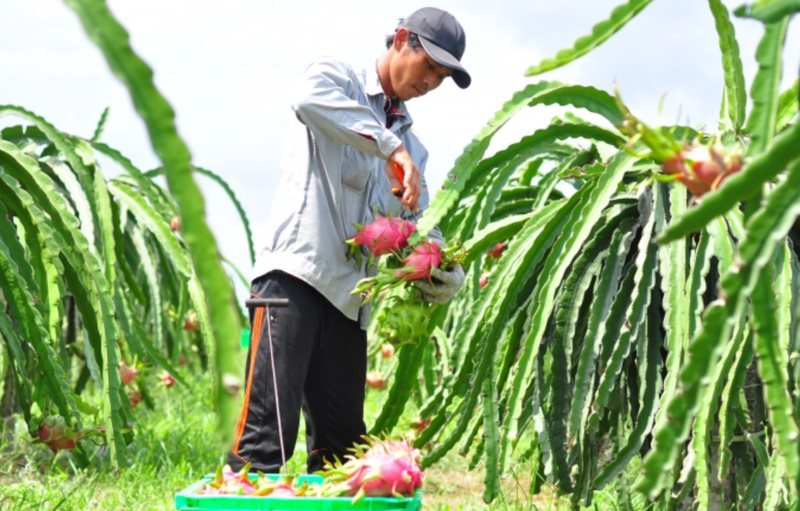Agricultures, Foods, News & Event
“Passport” for Vietnamese agricultural products
Traceability is considered a “passport” to enhance credibility and branding for agricultural export enterprises. This is also an important step that determines whether Vietnamese agricultural products can participate in the global supply chain or not.

Increase establishments granted planting area codes
In the era of information technology explosion, traceability is becoming an increasingly important factor in businesses. Consumers become more confident because they know the origin of the product they need. Providing clear and transparent information about origin helps create trust and confidence from customers, and traceability is also a tool to help businesses manage and control goods on the market.
Tien Giang is known as a land of rich and diverse agricultural products. The famous delicious fruits of this land include dragon fruit, rambutan, durian… These products of Tien Giang province have been creating their own mark on consumers. Recently, Tien Giang province has focused on granting planting area codes and affixing traceability stamps to agricultural products, thereby increasing the prestige and brand of local agricultural products.
Mr. Nguyen Van Man – Director of the Department of Agriculture and Rural Development of Tien Giang province said that up to this point, the entire Tien Giang province has been granted 528 planting area codes and packaging facility codes; Of which, the growing area code granted to the Chinese market is 183, an area of nearly 19,151 hectares, with 7 types of crops, including: jackfruit, dragon fruit, mango, watermelon, rambutan, longan and durian. Tien Giang has 307 packaging facility codes that have been granted for export, specifically the Chinese market has 299 codes, and difficult markets have 8 codes.
Dong Thap is the locality with the largest growing area codes in the country with more than 2,600 codes. Information from Dong Thap Department of Agriculture and Rural Development said that as of April 2024, the whole province has 1,261 domestic and export growing areas, with an area of more than 113,700 hectares; Of which, 2,637 codes (857 growing areas) with an area of more than 62,600 hectares serve the export market. With packaging facilities, there are 20 packaging facility codes in the province, including 12 packaging facilities exporting to China, Australia, Japan, New Zealand, and Korea.
The number of agricultural products granted planting area codes and stamped with traceability labels also increased in Vinh Long. Currently, the whole province has 117 growing areas granted export codes for fruit types (longan, rambutan, mango, dragon fruit, grapefruit, jackfruit, sweet potato, durian); 26 establishments packaging agricultural products for export.
Enhance the reputation and position of agricultural products
Experts assess that when strictly managing planting area codes and packaging facility codes, farmers change their thinking from agricultural production to agricultural economics, changing farmers’ awareness in revolution to develop smart agriculture and protect the ecological environment. At the same time, we will build a concentrated production material area, creating quality products with traceability and food safety and hygiene. From there, local agricultural products can fly high and reach international markets.
Appreciating the role of traceability of agricultural products, experts in the industry believe that this is the “passport” that affirms the reputation of the enterprise, thereby creating the enterprise’s position in the market both domestically and internationally. and abroad. In the context of consumers increasingly appreciating the quality of goods, they increasingly pay attention to choosing the best products, ensuring the highest safety, concerns about traceability and food safety are a concern. necessary. Therefore, businesses need to pay close attention to this “passport”.
Also affirming the important role of traceability, Mr. Tran Thanh Hai – Deputy Director of the Import-Export Department, Ministry of Industry and Trade said that, in the context of increasingly integrated economic integration, Vietnamese enterprises are facing challenges. There are huge challenges and obstacles when accessing domestic and foreign consumer markets due to the appearance of products of unknown origin. The international market is increasingly strict when introducing many regulations and procedures on food safety. Therefore, in order for exported goods to be able to expand their market and reach difficult markets such as the EU, US,…, Vietnam’s exported products, especially agricultural products, need to be Ensure requirements and regulations from the importing country, including requirements for traceability. Therefore, Mr. Hai recommended that to enhance the application of traceability, manufacturers, farmers and businesses need to change their thinking about international agricultural trade and be very proactive in meeting the requirements. requirements and standards of import markets, strictly and methodically implemented throughout the entire agricultural value chain from production, input, raw materials to processing to ensure product output quality.
Source: https://daidoanket.vn/tam-ho-chieu-cho-nong-san-viet-10280694.html

